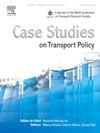Towards socially equitable public transport systems: The effect of COVID-19 on taxi trip behavior
IF 2.4
Q3 TRANSPORTATION
引用次数: 0
Abstract
The COVID-19 pandemic emerged as a very influential occurrence with a profound impact on a global scale. The onset of the pandemic abruptly disrupted the regular course of everyday activities, primarily impacting urban regions. Hence, it is imperative to understand the effects of the COVID-19 pandemic on modern urban areas. This study seeks to analyze the effect of the pandemic on travel behavior by utilizing GPS data obtained from taxis, with a specific focus on spatial socioeconomic features. The M2 metro line in Istanbul has been selected for evaluation. In this analysis, four distinct periods are considered: total, off-peak, morning, and evening peaks. The stations are categorized using K-means clustering. The estimation models are constructed using ordinary least squares (OLS), spatial autoregression (SAR), and geographically weighted regression (GWR) techniques, which are applied to the variation in daily average cab trips and the characteristics of stations. The GWR models provide superior performance in comparison to the other two models, with notable distinctions observed in peak times, particularly morning peak when compared to total and off-peak counts. The findings indicate that factors such as population, population density, socioeconomic status, and the quantity of shopping malls are influential variables in elucidating and forecasting the fluctuations in taxi trip counts.
实现社会公平的公共交通系统:COVID-19 对出租车出行行为的影响
COVID-19 大流行是一次极具影响力的事件,在全球范围内产生了深远的影响。大流行病的爆发突然打乱了日常活动的正常进程,主要影响到城市地区。因此,了解 COVID-19 大流行对现代城市地区的影响势在必行。本研究试图利用从出租车上获取的 GPS 数据分析大流行病对出行行为的影响,并特别关注空间社会经济特征。伊斯坦布尔的 M2 地铁线被选作评估对象。在分析中,考虑了四个不同的时段:总高峰、非高峰、早高峰和晚高峰。车站采用 K 均值聚类法进行分类。利用普通最小二乘法(OLS)、空间自回归(SAR)和地理加权回归(GWR)技术构建了估算模型,并将其应用于日均出租车出行量的变化和车站的特征。与其他两种模型相比,地理加权回归模型具有更优越的性能,在高峰时段,特别是早高峰与总计数和非高峰计数相比,观察到明显的差异。研究结果表明,人口、人口密度、社会经济地位和购物中心数量等因素是阐明和预测出租车出行次数波动的影响变量。
本文章由计算机程序翻译,如有差异,请以英文原文为准。
求助全文
约1分钟内获得全文
求助全文

 求助内容:
求助内容: 应助结果提醒方式:
应助结果提醒方式:


